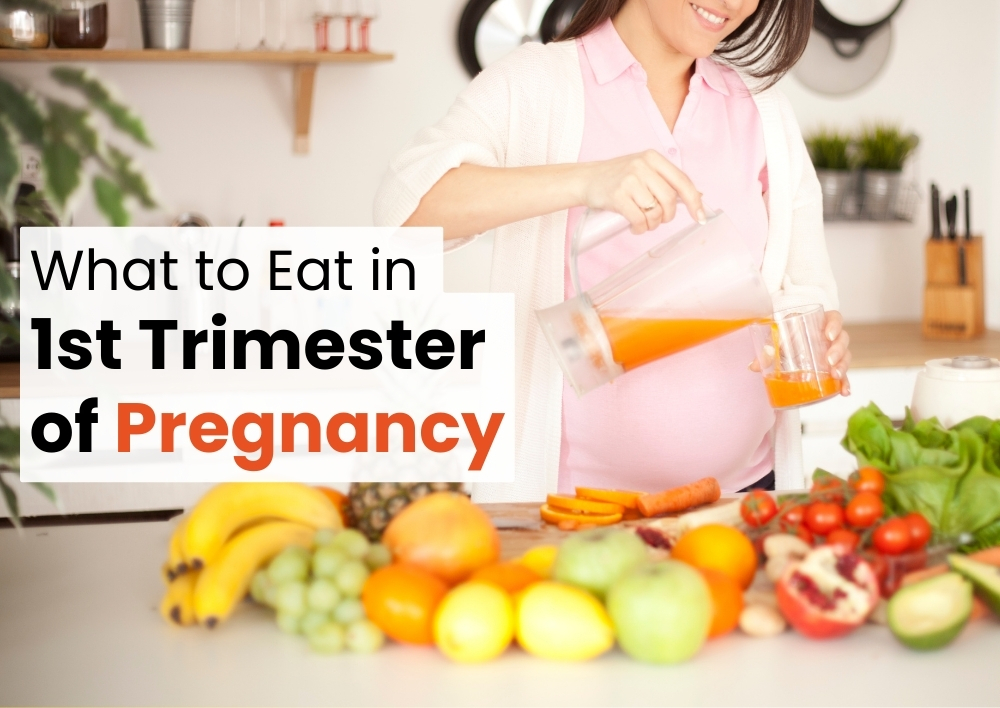What to Eat in 1st Trimester of Pregnancy
From the moment you realize you are expecting, your focus shifts to nurturing the tiny miracle growing inside you. The first trimester is like planting the seeds for a healthy future, where every bite contributes to building the foundation of your baby’s life. While the world outside continues at its usual pace, your body is orchestrating a remarkable symphony of development. Understanding what to eat during the first trimester of pregnancy is crucial for ensuring both a healthy pregnancy and a healthy baby. Here’s a detailed blog post, crafted with insights from one of the top gynaecologist doctors in gurgaon at Miracles Apollo Cradle, on what to eat in 1st trimester of pregnancy to meet both your nutritional needs and those of your growing baby.
Understanding the First Trimester
The first trimester spans the initial 12 weeks (3 months) of pregnancy. During this time, your baby develops rapidly, evolving from a tiny cluster of cells into a fetus with a beating heart, brain, spinal cord, and other essential organs. While this development is truly remarkable, it can also come with challenges such as nausea, fatigue, and food aversions, making it difficult to maintain a nutritious diet.
Key Nutrients for the First Trimester
-
Folic Acid: Folic acid is a vital B vitamin that plays an important role in forming the neural tube, which will develop into the baby's brain and spinal cord. A sufficient amount of folic acid intake can help prevent neural tube defects. The rich sources of folic acid include leafy green vegetables, citrus fruits, beans, peas, and fortified cereals.
-
Iron: Iron is essential for producing hemoglobin, the protein in red blood cells that carries oxygen to your tissues and your baby. As your blood volume increases during pregnancy, you need more iron to supply oxygen to your growing baby. Rich sources of iron include lean meats, poultry, fish, lentils, spinach, and fortified cereals.
-
Calcium: Calcium is important for developing your baby’s bones and teeth. It also supports your circulatory, muscular, and nervous systems. You can find calcium in dairy products such as milk, cheese, and yogurt, as well as fortified plant-based milk alternatives and leafy greens like kale and broccoli.
-
Vitamin D: Vitamin D works with calcium to promote the development of your baby’s bones and teeth. This vitamin D also supports your immune system and overall health. Sources of vitamin D include fatty fish like salmon and sardines, fortified milk and orange juice, and sunlight exposure.
-
Protein: Protein is important for the growth of fetal tissue, including the brain. It also helps in tissue repair and growth. Protein-rich foods include lean meats, poultry, fish, eggs, nuts, seeds, tofu, and legumes.
-
Omega-3 Fatty Acids: Omega-3 fatty acids, particularly DHA, are important for the development of your baby’s brain and eyes. Rich sources include fatty fish like salmon, flaxseeds, chia seeds, and walnuts.
Now, let’s explore what to eat at the first trimester of pregnancy to ensure both you and your baby get the necessary nutrients.
What to Eat in the First Month of Pregnancy?
Month 1: Weeks 1-4
1. For Early Development: During the first month, your baby’s development starts rapidly, and your body begins adjusting to pregnancy. Focus on key nutrients to support this early stage and manage initial pregnancy symptoms.
-
Folic Acid: Include folic acid-rich foods in your diet to support the formation of the neural tube. Enjoy leafy greens (spinach, kale), citrus fruits (oranges, grapefruits), beans, peas, and fortified cereals.
-
Iron: Increase your iron intake to support increased blood volume and prevent fatigue. Eat lean meats, poultry, fish, lentils, spinach, and fortified cereals.
-
Calcium: Add calcium-rich foods to your diet to support your baby’s future bone development. Include dairy products (milk, cheese, yogurt), fortified plant-based milk alternatives, and leafy greens like kale and broccoli.
2. Managing Symptoms
-
Nausea: Eat small, frequent meals and snack on bland foods like crackers or toast. Sip ginger tea to help with nausea.
What to Eat in the 2nd Month of Pregnancy?
Month 2: Weeks 5-8
1. For Developing Organs and Systems: During the second month, your baby’s organs and systems form. Focus on nutrients that support these developments and manage increasing pregnancy symptoms.
-
Protein: Increase your protein intake to support fetal tissue development and your tissue repair. Include lean meats, poultry, fish, eggs, nuts, seeds, tofu, and legumes in your diet.
-
Omega-3 Fatty Acids: Add omega-3 fatty acids to aid brain and eye development. Eat fatty fish (salmon, sardines), flaxseeds, chia seeds, and walnuts.
-
Vitamin D: Get enough vitamin D to help calcium absorption and support overall health. Choose fatty fish, fortified milk, and orange juice, and get some sunlight.
2. For Managing Symptoms
-
Fatigue: Eat iron-rich foods and stay hydrated to combat tiredness. Combine iron sources with vitamin C-rich foods to enhance absorption.
What to Eat in the 3rd Month of Pregnancy?
Month 3: Weeks 9-12
1. For Supporting Growth and Development: In the third month, your baby’s development continues to advance, and your body’s needs become more specific. Focus on maintaining a balanced diet to support both your and your baby’s health.
-
Fiber: Increase your fiber intake to help with common pregnancy issues like constipation. Eat whole grains (brown rice, quinoa), fruits (apples, pears), and vegetables (sweet potatoes, carrots).
-
Hydration: Stay hydrated to support digestion and overall health. Drink water, and herbal teas, and eat fruits with high water content (cucumbers, watermelon).
-
Balanced Meals: Ensure each meal contains a balance of protein, healthy fats, and carbohydrates to maintain energy levels.
2. For Managing Symptoms
-
Constipation: Eat more fiber and drink plenty of water to prevent constipation.
By following this month-by-month guide on what to eat in 1st trimester of pregnancy, you can ensure that you are meeting both your nutritional needs and those of your growing baby, setting a strong foundation for a healthy pregnancy.
What To Avoid During the First Trimester?
-
High-Mercury Fish: Fish such as sharks, swordfish, king mackerel, and tilefish are high in mercury, which can harm your baby’s developing nervous system. It is best to opt for safer options like salmon, shrimp, and canned light tuna.
-
Undercooked or Raw Seafood, Meat, and Eggs: Consuming undercooked or raw seafood, meats, and eggs can increase the risk of infections that could harm your baby. Ensure all these foods are thoroughly cooked.
-
Unpasteurized Dairy Products and Juices: Unpasteurized products may contain harmful bacteria such as listeria, which can lead to pregnancy complications. Always choose pasteurized options.
-
Caffeine: While moderate caffeine consumption is considered safe during pregnancy, it's advisable to limit intake to 200 mg per day.
-
Alcohol: There is no known safe amount of alcohol during pregnancy, so it’s best to avoid it entirely to prevent potential harm to your baby.
Managing First Trimester Symptoms
-
Nausea and Morning Sickness: Eat small, frequent meals throughout the day to keep your stomach settled. Ginger tea or ginger candies may also help relieve nausea.
-
Fatigue: Focus on iron-rich foods like lean meats, beans, and spinach to help overcome fatigue. Pair the iron-rich foods with vitamin C-rich foods to enhance iron absorption.
-
Constipation: Increase your fiber intake with whole grains, fruits, and vegetables, and stay hydrated by drinking plenty of water.
Practical Tips for a Balanced Diet During Pregnancy
-
Plan Your Meals: Planning meals in advance can help ensure you are getting a variety of nutrients. Include a balance of protein, healthy fats, and carbohydrates in each meal.
-
Listen to Your Body: Your body knows what it needs, so pay attention to hunger signals and eat when you are hungry.
-
Stay Hydrated: Drink a lot of water throughout the day to support health.
-
Consult a Gynecologist: If you have specific dietary concerns or conditions, consult your gynecologist for personalized advice.
Conclusion:
The first trimester of pregnancy is a time of significant change and development for both you and your baby. Eating a well-balanced diet rich in vital nutrients can support your baby’s growth and help you manage common pregnancy symptoms. Remember, every pregnancy is unique, so it’s important to listen to your body and consult with a gynecologist for tailored dietary advice.
For personalized guidance and expert advice on what to eat in 1st trimester of pregnancy and to maintain a healthy diet throughout your pregnancy, schedule a consultation with our best gynaecologist near you at Miracles Healthcare. Our team supports you every step of the way, ensuring both you and your baby get the best start possible. Contact us today to book your appointment and take the first step towards a healthy and happy pregnancy!














Was the information useful?
0 0